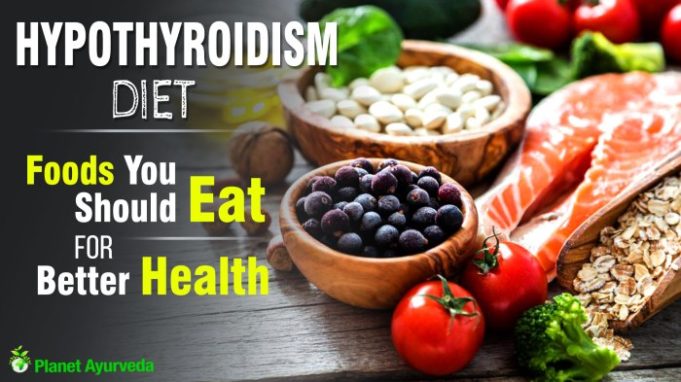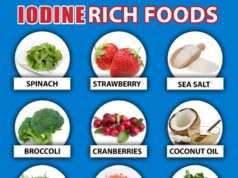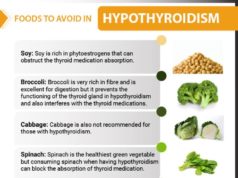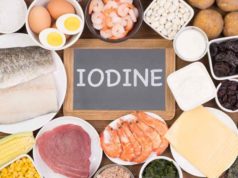How to treat hypothyroidism diet sets the stage for this enthralling narrative, offering readers a glimpse into a story that is rich in detail and brimming with originality from the outset. Hypothyroidism, a condition where the thyroid gland doesn’t produce enough thyroid hormone, can significantly impact your health and well-being. While medication is often prescribed to manage this condition, a well-balanced diet can play a crucial role in supporting thyroid health and alleviating symptoms.
This comprehensive guide will explore the dietary aspects of managing hypothyroidism, highlighting foods that promote thyroid function and those to avoid. We’ll delve into the importance of essential nutrients like iodine and selenium, and provide practical tips for incorporating thyroid-friendly foods into your daily meals. Additionally, we’ll discuss the potential benefits of nutritional supplements and lifestyle modifications that can contribute to overall well-being.
Understanding Hypothyroidism
Hypothyroidism is a condition where the thyroid gland doesn’t produce enough thyroid hormone, which is essential for regulating metabolism and other bodily functions. This can lead to a range of symptoms and health problems.
The Role of the Thyroid Gland
The thyroid gland, located in the front of the neck, is responsible for producing thyroid hormone, which plays a vital role in regulating metabolism, heart rate, body temperature, and brain development. It also influences how the body uses energy.
Causes of Hypothyroidism
Hypothyroidism can be caused by various factors, including:
- Hashimoto’s thyroiditis: An autoimmune disorder where the body’s immune system attacks the thyroid gland, causing it to become inflamed and unable to produce enough thyroid hormone.
- Thyroid surgery: Removal of all or part of the thyroid gland can lead to hypothyroidism.
- Radioactive iodine treatment: Used to treat hyperthyroidism, it can sometimes damage the thyroid gland, leading to hypothyroidism.
- Medications: Certain medications, such as lithium and interferon-alpha, can interfere with thyroid hormone production.
- Iodine deficiency: While rare in developed countries, iodine deficiency can lead to hypothyroidism.
- Pituitary gland disorders: The pituitary gland, located in the brain, controls the thyroid gland’s function. If the pituitary gland is not working properly, it can lead to hypothyroidism.
Symptoms of Hypothyroidism
Hypothyroidism can manifest in various ways, with symptoms often developing gradually. Some common symptoms include:
- Fatigue and weakness: Low thyroid hormone levels can affect energy production, leading to persistent tiredness and difficulty performing daily tasks.
- Weight gain: Hypothyroidism can slow down metabolism, making it harder to lose weight and potentially leading to weight gain.
- Cold intolerance: Reduced thyroid hormone levels can affect body temperature regulation, making individuals feel cold even in warm environments.
- Constipation: Slowed metabolism can affect digestive function, leading to constipation.
- Dry skin and hair: Hypothyroidism can affect skin and hair health, leading to dryness, thinning, and hair loss.
- Depression and mood changes: Low thyroid hormone levels can affect brain function, leading to depression, anxiety, and mood swings.
- Muscle aches and stiffness: Hypothyroidism can affect muscle function, leading to aches, stiffness, and weakness.
- Slow heart rate: Reduced thyroid hormone levels can slow down heart rate.
- Irregular menstrual cycles: Hypothyroidism can affect hormone balance, leading to irregular menstrual cycles in women.
Risks of Untreated Hypothyroidism
Untreated hypothyroidism can lead to various health complications, including:
- Heart disease: Hypothyroidism can increase the risk of heart disease by affecting heart rate, blood pressure, and cholesterol levels.
- High cholesterol: Hypothyroidism can increase cholesterol levels, increasing the risk of heart disease.
- Depression and anxiety: Hypothyroidism can affect brain function, leading to depression and anxiety.
- Infertility: Hypothyroidism can affect hormone balance, leading to infertility in both men and women.
- Goiter: The thyroid gland may enlarge in an attempt to produce more thyroid hormone, leading to a goiter, a visible swelling in the neck.
- Myxedema coma: A rare but serious complication of severe hypothyroidism, characterized by decreased mental alertness, coma, and potentially life-threatening.
Dietary Considerations for Hypothyroidism
Hypothyroidism is a condition where the thyroid gland doesn’t produce enough thyroid hormone. This hormone is essential for many bodily functions, including metabolism, growth, and development. While medication is the primary treatment for hypothyroidism, dietary changes can also play a significant role in managing symptoms and supporting overall thyroid health.
Foods That Support Thyroid Health
Eating a balanced diet rich in essential nutrients can contribute to optimal thyroid function. Here’s a list of foods that are particularly beneficial for people with hypothyroidism:
- Seafood: Seafood, especially oily fish like salmon, tuna, and mackerel, is a good source of omega-3 fatty acids, which may help reduce inflammation and improve thyroid function. These fish are also rich in selenium, a mineral crucial for thyroid hormone production.
- Brazil Nuts: These nuts are packed with selenium, making them an excellent source for meeting daily requirements. A few Brazil nuts can provide a significant amount of selenium.
- Eggs: Eggs are a good source of protein, vitamin D, and selenium, all of which contribute to thyroid health. They are also a good source of zinc, which is involved in the production of thyroid hormone.
- Dairy Products: Dairy products like milk, yogurt, and cheese are good sources of calcium, vitamin D, and iodine. These nutrients are important for thyroid health.
- Fruits and Vegetables: Fruits and vegetables are rich in antioxidants, vitamins, and minerals that can support thyroid function. Include a variety of colorful fruits and vegetables in your diet, such as berries, leafy greens, and cruciferous vegetables like broccoli and cauliflower.
- Whole Grains: Whole grains like brown rice, quinoa, and oats are good sources of fiber, which can help regulate blood sugar levels and improve overall health, including thyroid function.
- Lean Meats: Lean meats like chicken and turkey are good sources of protein and zinc, which are essential for thyroid health.
Iodine and Thyroid Health
Iodine is a crucial mineral for the thyroid gland’s production of thyroid hormones. Iodine deficiency can lead to hypothyroidism.
- Foods Rich in Iodine: Include foods rich in iodine in your diet to ensure adequate intake. These include seafood (especially cod, tuna, and seaweed), dairy products, and iodized salt.
- Iodized Salt: Use iodized salt for cooking and at the table. It’s a readily available and affordable source of iodine.
- Avoid Excessive Iodine Intake: While iodine is essential, excessive intake can also be harmful. Consult with your doctor or a registered dietitian to determine the appropriate iodine intake for your specific needs.
Selenium and Thyroid Function
Selenium is a trace mineral that plays a vital role in thyroid hormone production and metabolism. It’s a key component of the enzyme that converts inactive thyroid hormone (T4) to active thyroid hormone (T3).
- Selenium-Rich Foods: Include selenium-rich foods in your diet to support optimal thyroid function. These include Brazil nuts, tuna, eggs, and sunflower seeds.
- Selenium Supplements: If you’re deficient in selenium, your doctor may recommend a selenium supplement. However, it’s essential to take supplements under the guidance of a healthcare professional.
Dietary Recommendations for Managing Hypothyroidism Symptoms, How to treat hypothyroidism diet
- Eat Regularly: Avoid skipping meals, as it can lead to fluctuations in blood sugar levels and worsen hypothyroidism symptoms like fatigue and brain fog.
- Stay Hydrated: Drink plenty of water throughout the day to help regulate body temperature and improve overall health.
- Limit Processed Foods: Processed foods are often high in sugar, unhealthy fats, and additives that can contribute to inflammation and worsen hypothyroidism symptoms.
- Reduce Sugar Intake: Excess sugar can interfere with thyroid function and worsen symptoms. Opt for natural sweeteners like honey or maple syrup in moderation.
- Limit Caffeine and Alcohol: Caffeine and alcohol can interfere with sleep and worsen hypothyroidism symptoms. Reduce your intake or avoid these substances altogether.
Sample Meal Plan
Here’s a sample meal plan that incorporates thyroid-friendly foods:
Breakfast
- Scrambled eggs with spinach and a slice of whole-grain toast
- Oatmeal with berries and a handful of nuts
- Yogurt with fruit and a sprinkle of chia seeds
Lunch
- Tuna salad sandwich on whole-grain bread
- Chicken breast with roasted vegetables
- Quinoa salad with grilled salmon and avocado
Dinner
- Baked salmon with roasted broccoli and brown rice
- Lentil soup with a side of whole-grain bread
- Chicken stir-fry with brown rice and mixed vegetables
Snacks
- Brazil nuts
- Fruit
- Yogurt
Foods to Avoid with Hypothyroidism: How To Treat Hypothyroidism Diet
While a balanced diet is crucial for everyone, it’s particularly important for individuals with hypothyroidism. Certain foods can interfere with thyroid hormone production, potentially worsening symptoms.
Goitrogens and Their Impact
Goitrogens are naturally occurring compounds found in some foods that can interfere with thyroid hormone production. They can inhibit the uptake of iodine, a crucial element for thyroid hormone synthesis, or block the enzyme responsible for converting inactive thyroid hormone (T4) into active thyroid hormone (T3).
Foods to Limit or Avoid
It’s important to note that the impact of goitrogens varies depending on individual factors, such as the amount consumed, cooking methods, and overall diet. However, limiting the following foods can be beneficial for individuals with hypothyroidism:
- Cruciferous Vegetables: These include broccoli, cauliflower, kale, cabbage, and Brussels sprouts. While these vegetables are generally healthy, they contain goitrogens that can interfere with thyroid hormone production. Cooking these vegetables thoroughly can significantly reduce their goitrogen content.
- Soy Products: Soybeans, tofu, tempeh, and soy milk contain goitrogens that can interfere with thyroid hormone production. Individuals with hypothyroidism may need to limit their intake of soy products.
- Peanuts: Peanuts contain goitrogens that can interfere with thyroid hormone production. Individuals with hypothyroidism may need to limit their intake of peanuts.
- Cassava: Cassava, a starchy root vegetable, contains goitrogens that can interfere with thyroid hormone production. Individuals with hypothyroidism may need to limit their intake of cassava.
- Peaches and Strawberries: While these fruits are generally healthy, they contain goitrogens that can interfere with thyroid hormone production. Individuals with hypothyroidism may need to limit their intake of peaches and strawberries.
Processed Foods and Artificial Sweeteners
Beyond goitrogens, processed foods and artificial sweeteners can also pose challenges for individuals with hypothyroidism.
- Processed Foods: These foods often contain high levels of sugar, unhealthy fats, and additives that can contribute to inflammation and hinder thyroid function. Focusing on whole, unprocessed foods is generally recommended for optimal thyroid health.
- Artificial Sweeteners: While marketed as sugar substitutes, artificial sweeteners like aspartame, sucralose, and saccharin have been linked to various health issues, including gut dysbiosis, which can impact thyroid function. Opting for natural sweeteners like stevia or honey in moderation can be a healthier alternative.
Nutritional Supplements for Hypothyroidism
While a balanced diet is crucial for managing hypothyroidism, some individuals may benefit from supplementing with specific nutrients. Consulting a healthcare professional is always recommended before starting any new supplements, as they can help determine your individual needs and potential interactions with existing medications.
Zinc
Zinc plays a vital role in thyroid hormone production and metabolism. Studies suggest that individuals with hypothyroidism may have lower zinc levels, potentially contributing to their condition. Supplementing with zinc may help improve thyroid function and overall well-being.
Vitamin D
Vitamin D deficiency is common in individuals with hypothyroidism. Vitamin D is essential for the absorption of calcium, which is crucial for thyroid hormone production. Supplementing with vitamin D may help improve thyroid function and reduce the risk of bone loss, a common complication of hypothyroidism.
B Vitamins
B vitamins, particularly B12, are crucial for thyroid hormone production and metabolism. Deficiency in B vitamins can worsen hypothyroidism symptoms. Supplementing with B vitamins may help improve energy levels, mood, and cognitive function.
Probiotics
Probiotics are beneficial bacteria that reside in the gut and play a crucial role in gut health. Recent research suggests a link between gut health and thyroid function. Probiotics may help improve digestion, reduce inflammation, and potentially support thyroid function.
Lifestyle Modifications for Hypothyroidism
Making lifestyle changes can significantly improve your overall well-being and help manage hypothyroidism symptoms. These changes work in conjunction with medication and dietary adjustments to enhance your thyroid health and overall quality of life.
Regular Exercise
Regular exercise is crucial for managing hypothyroidism symptoms. Physical activity boosts energy levels, improves mood, and helps regulate weight. Aim for at least 30 minutes of moderate-intensity exercise most days of the week. Examples include brisk walking, swimming, cycling, or dancing. Consult your doctor before starting any new exercise program, especially if you have any underlying health conditions.
Managing Stress Levels
Chronic stress can exacerbate hypothyroidism symptoms. Finding healthy ways to manage stress is essential. Techniques like yoga, meditation, deep breathing exercises, and spending time in nature can help reduce stress levels. Engaging in activities you enjoy, such as listening to music, reading, or spending time with loved ones, can also promote relaxation and reduce stress.
Adequate Sleep
Getting enough sleep is vital for overall health and thyroid function. When you’re sleep-deprived, your body produces more cortisol, a stress hormone that can interfere with thyroid hormone production. Aim for 7-8 hours of quality sleep each night. Establishing a regular sleep schedule, creating a relaxing bedtime routine, and ensuring a dark, quiet, and cool sleeping environment can help improve sleep quality.
Other Lifestyle Changes
- Maintain a healthy weight: Being overweight or obese can worsen hypothyroidism symptoms. Aim for a gradual and sustainable weight loss through a balanced diet and regular exercise.
- Limit caffeine and alcohol intake: Caffeine and alcohol can interfere with thyroid hormone production and worsen symptoms.
- Avoid smoking: Smoking can negatively impact thyroid function and overall health.
- Stay hydrated: Drink plenty of water throughout the day to support optimal thyroid function.
- Get regular checkups: Regular medical checkups and blood tests can help monitor your thyroid hormone levels and ensure your treatment plan is effective.
The Importance of Consulting a Healthcare Professional
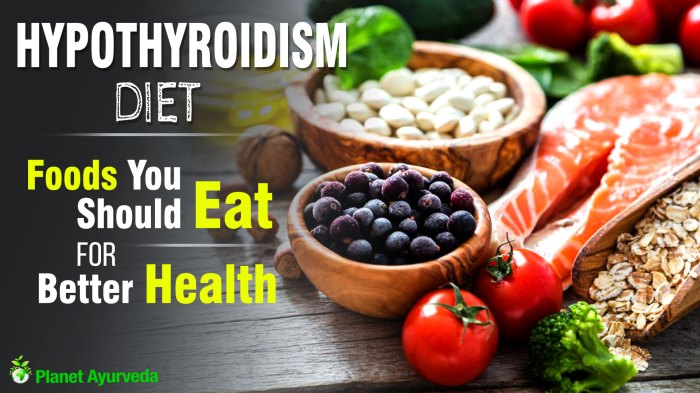
Hypothyroidism is a serious condition that requires medical attention. While lifestyle changes and dietary adjustments can play a role in managing the condition, they should never replace professional medical care. It is crucial to consult with a healthcare professional for proper diagnosis, treatment, and ongoing monitoring.
The Role of Diagnosis and Treatment Plans
A healthcare professional will conduct a thorough evaluation, including a physical exam and blood tests, to diagnose hypothyroidism. Based on the diagnosis, they will create a personalized treatment plan that may involve medication, dietary recommendations, and lifestyle modifications.
The Importance of Medication
Medication, usually in the form of synthetic thyroid hormone, is often the primary treatment for hypothyroidism. It replaces the thyroid hormone that your body is not producing adequately. Medication helps to restore normal thyroid hormone levels and alleviate symptoms.
Regular Monitoring and Adjustments
Regular monitoring is essential to ensure that your treatment plan is effective. Your healthcare provider will monitor your thyroid hormone levels through blood tests and adjust your medication dosage as needed. This ensures that your thyroid hormone levels remain within the optimal range and that your symptoms are effectively managed.
Final Thoughts
By understanding the role of diet in managing hypothyroidism, you can take an active role in supporting your thyroid health. Remember, it’s essential to consult with a healthcare professional for a proper diagnosis and personalized treatment plan. With a combination of medication, dietary adjustments, and lifestyle modifications, you can effectively manage hypothyroidism and improve your quality of life.
FAQ Section
Can I cure hypothyroidism with diet alone?
While a healthy diet can support thyroid health, it cannot cure hypothyroidism. Medication is typically required to manage the condition effectively.
Are there any specific foods I should eat to increase thyroid hormone production?
While some foods are beneficial for thyroid health, there is no single food that directly increases thyroid hormone production. It’s essential to maintain a balanced diet rich in thyroid-supporting nutrients.
What if I have food allergies or sensitivities?
If you have food allergies or sensitivities, it’s crucial to work with a registered dietitian to create a personalized diet plan that accommodates your needs while supporting thyroid health.















